A note before we begin: Given that the term "Women in Refrigerators" originated in relation to comics, it should be obvious that this problem is not unique to World of Warcraft or Blizzard. In fact, in nearly every form of popular media the same tropes play out for women over and over again. I could rant about Lucy's fate in the Assassin's Creed series, or Tara's tragic end in season six of Buffy the Vampire Slayer; however, this blog is about World of Warcraft and as such it'll focus on Blizzard and World of Warcraft's treatment of women characters. Aside from that, the idea that Blizzard not being the only one who treats its women characters this way neither absolves them of their (unintended) misogyny or excuses it.
Also:
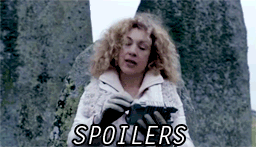 |
| You've been warned. |
Introduction
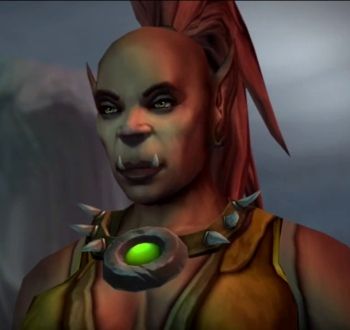 |
| What did you say about childbirth? |
The story usually goes like this: There's a male character in need of some development, whether it be that he's had it pretty good for some time and needs a little tragedy, or he needs motivation to perform one heroic act or finally gather the courage to take out the big bad. All too often the way this is accomplished is by taking out the closest female character to the male. It happens with such frequency that feminist fans have coined a term for it: Fridging or "stuffed into a refrigerator," which is derived from Gail Simone's "Women in Refrigerators" website. Obviously, there are no refrigerators in Azeroth (or at least not any that run on electricity), but there are a considerable number of women who meet tragic ends and/or are dis-empowered so that their male counterparts can go on to do things that impact the plot in a major way up to and including saving the day.
This isn't to say that male NPCs are immune to dying in Azeroth, which would be a rather silly argument as Malygos, Illidan, and Arthas among others have all met their ends. However, the difference lies mostly in how they die and that women are dying at a disproportionate rate. And sometimes it's not only that the women die, it's that they disappear after serving a single-use purpose never to be mentioned again. Some women who by all rights should be important are never even given names.
Who's that Lady?
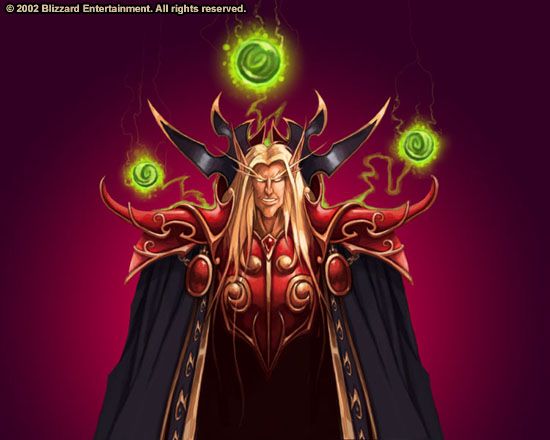 |
| A face only a mother could love? |
Jaina's case is particularly frustrating, not only because she's a woman herself and it might be nice to see another woman struggling to be a leader (or at least a member of nobility) in a world dominated by male leaders she could be close to, but because Jaina herself doesn't seem to remember having a mother at all.
She was the daughter of the lord admiral, and her brother had once quipped that the Proudmoores all had seawater in their veins. A hint of melancholy touched her as she thought of her father and brother. She lingered for a moment longer, remembering, then turned from the window. - Tides of War, Chapter 5, pp 47She thinks of her brother and father, yet not her mother. It's possible she never knew her mother as she could have died when Jaina was young, or died during childbirth (which, as we'll see, happens to a lot of Azerothian women), but as she's never so much as mentioned by name, that's difficult to say. Of course being a mother with a name is not so great either.
A Purposeless Life
Another important woman in Arthas's life was his sister Calia Menethil. Calia appears to have only been introduced for the purpose of arranging a marriage to Daval Prestor, the human disguise of Deathwing. When he disappeared, so too did Calia, and we're left with only speculation as to what her fate is. Apart from a vague thought from Arthas on how his sister is "gone," she's not even served up as grief fodder for her brother. Like mother, like daughter, but who cares when we've got an awesome male character, right?
Elena Mograine, mother to Renault and Darion Morgraine, seems to only have existed long enough to produce children. She died giving birth to Darion and, apart from providing a tombstone for her husband Alexandros to talk to in the first Ashbringer comic, has nothing further to do with the plot.
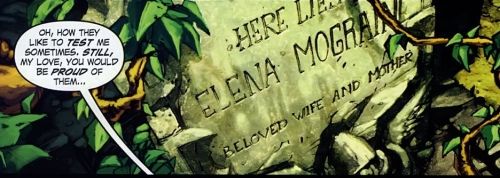 |
| Gone and not...okay, she's forgotten. |
Maybe Having a Purpose isn't All it's Cracked Up to Be
 |
| I found it in this bag... |
Of course, it isn't always male characters who need the occasional nudge toward an important character development, but even then it seems women must be the ones to die. In Tides of War, we're introduced to Kinndy, a spunky, smart-mouthed gnome who's been assigned to be Jaina Proudmoore's apprentice. Naturally, Kinndy is endearing and many of us who read the books figured out early on she was probably wearing a red shirt underneath her mage robes (because Blizzard tends to be predictable). Kinndy dies in the bombing of Theramore, and it's her death that finally sends Jaina Proudmoore into an uncharacteristic genocidal rage.
Kinndy lay face down in a still puddle of her own blood. The crimson stain had tainted her pink hair, matting it, and Jaina realized she wanted to plop Kinndy into a hot bath and help her scrub herself clean, get her a fresh new robe--
She fell to her knees and placed a hand on the girl's shoulder, to turn her over. Kinndy's body crumbled into shining violet dust.
Jaina screamed.
She screamed in utter horror, frantically gathering up the crystalline powder that was all that remained of a smart, lively young woman. She screamed in loss, in grief, in guilt, and then most of all, in rage.
Rage at the Horde. Rage at Garrosh Hellscream, rage at those who followed him. Rage at Baine Bloodhoof, who had warned her but had nonetheless permitted this to happen. Had perhaps known this was going to happen.
[...]
[She encounters some orcs not far from Kinndy's body and dispatches them with some magical bad-assery.]
"Your people are despicable cowards," she hissed. "You are nothing more than rabid dogs, and you should be put down. You spit on mercy? Then you will have none. You want carnage? Garrosh will get more blood than ever he bargained for."
Then, with a savage cry, she brought the shard of mirror down into the small space between the orc's gorget and his shoulder armor. Blood spurted up, covering her hand, splashing her face. - Tides of War, Chapter 19, pp 220, 222
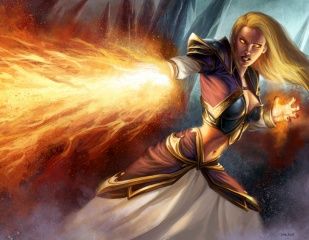 |
| The last thing those orcs saw. |
Compare and Contrast
As I said, it's not only that women are dying at a rate disproportionate to male characters in World of Warcraft, it's also how men died compared to women. For the gnome Kinndy, death is something that happens to her while she's helping to close the gates to Theramore. Granted, plenty of men died in Theramore too, but we're not privy to their lives and stories the same way we are Kinndy and Jaina. But there is another important character death in Tides of War: Rhonin.
Rhonin goes into his death fully aware of what's about to happen. Unlike Kinndy and Pained who were caught unaware in the bomb's blast, Rhonin makes a conscious decision to draw the bomb toward him in a tower that's infused with magical wards. His decision helps lessen the impact of the mana bomb, allows Jaina to be pulled through a portal just in time, and contains the bomb enough that his wife and mother of his twins are at a safe enough distance to survive the blast. His death is a courageous self-sacrifice while Kinndy is collateral damage and angst fodder for Jaina.
One powerful and very recent example of this difference in deaths takes place in Mists of Pandaria in the Krasarang Wilds quest-line. Horde side you encounter the Sunwalkers, Dezco and Leza at Thunder Cleft who have come to Pandaria to find the source of a vision Leza had (that you later know is the Vale of Eternal Blossoms). Alliance side you meet Lorekeeper Vaeldrin and his daughter Lyalia who are based at the Incursion and are there in search of the Pools of Youth.
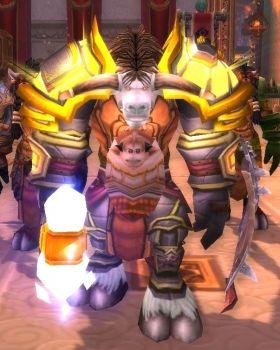 |
| Dual-Wielding Babies |
For the Horde part of things, your time is spent not only investigating the Mogu, but also gathering items to try to help Leza through a difficult childbirth. The entire time you're there, she can be seen inside the tent apparently in labor. Despite your hard work and Dezco's valiant efforts, Leza dies due to complications from childbirth, but not before she gives birth to a pair of healthy twin sons. Once you're treated to a cut scene of some mourners building a pyre for Leza, you see Dezco tending to his new sons. When you turn in the quest he tells you his wife has passed despite his powers of the Light and, "Thanks to your help, however...we saved my sons." Afterward, whenever you encounter Dezco he's carrying his twin sons around and hardly mentions Leza again. Like Elena Mograine, Leza is here only long enough to provide her husband with children (sons).
On the Alliance side of things, Lorekeeper Vaeldrin has come to Pandaria in search of the Pools of Youth. With him is his daughter Lyalia who gets you to help deal with a Horde courier and to check out what the Mogu are up to while her father is distracted by pretty artifacts. At the end of the quest line, Lyalia dies in a confrontation with a powerful Mogu. Blaming himself for being so insistent on looking for the secret to immortality, Vaeldrin ends up using the magic he's discovered to transfer his life force to his daughter, thus sacrificing himself so that she can live.
Leza dies in childbirth while Vaeldrin makes a heroic sacrifice to save his daughter. Again the difference between death happening to a character and the character making an active choice to lay down his life. In fact, after watching Leza die on my first playthrough of Krasarang Wilds, I was inspired to make this post.
It's Not You, It's the Patriarchy (and Male Privilege)
Why are women more likely to be sacrificed for the sake of telling a (supposedly) good story? The answer is...it's complicated. I made a little note at the beginning of this that this isn't a problem unique to Blizzard, and in every form of entertainment it's easy to see this played out over and over again. From television shows like Supernatural (a series whose entire story starts with the death of a wife and mother) to songs like Tim McGraw's "Don't Take the Girl" (where a woman is put in danger of being robbed and potentially raped and then maybe dies in childbirth) to video games like World of Warcraft women die and/or are threatened with death on a regular basis, usually so their male counterparts can save the day or experience some sort of character development. It's in our culture, a culture we eat, sleep, and breathe in every single day of our existence.
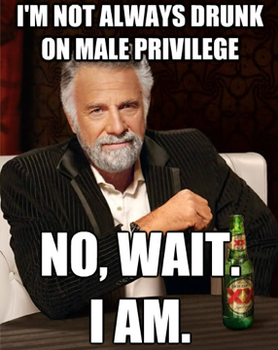 What's most depressing about all of this is that I know none of it's intentional, at least not on Blizzard's part. In fact, many people don't realize what's happening until someone either points it out by writing about it and drawing attention to the matter, or they have an epiphany like I and other players did. None of the writers or developers are sitting around an office with a list of all female characters in World of Warcraft gleefully cackling while asking themselves, "Which women do we kill off today and how?" Chances are they're writing the stories and it never occurs to them to ask why this woman or that woman has to die. In fact, in the world of video games, many are still dominated by men who never have to ask themselves these questions by benefit of their male privilege. As men characters are rarely subjected to the same sort of treatment as female characters, at least on a regular basis, it's not really a problem to them.
What's most depressing about all of this is that I know none of it's intentional, at least not on Blizzard's part. In fact, many people don't realize what's happening until someone either points it out by writing about it and drawing attention to the matter, or they have an epiphany like I and other players did. None of the writers or developers are sitting around an office with a list of all female characters in World of Warcraft gleefully cackling while asking themselves, "Which women do we kill off today and how?" Chances are they're writing the stories and it never occurs to them to ask why this woman or that woman has to die. In fact, in the world of video games, many are still dominated by men who never have to ask themselves these questions by benefit of their male privilege. As men characters are rarely subjected to the same sort of treatment as female characters, at least on a regular basis, it's not really a problem to them.
One of Bioware's lead writers observed this phenomenon and wrote about it on his Tumblr just the other day regarding a situation in which the female writers on staff read a particular situation as rape whereas the men never saw it until it was pointed out to them.
Here’s the thing: after the meeting was over, it struck me how sharply divided the reviewers were on gender lines. The guys involved, all reasonable and liberal-minded fellows I assure you (including me!) all automatically took the intended viewpoint of the author and didn’t see the issue. The girls had all taken the other side of the encounter, and saw it completely differently— all of them. As soon as it was pointed out, it was obvious… but why hadn’t we seen it?
And this thought occurred as well: if this had been a team with no female perspective present, it would have gone into the game that way. Had that female writer been the lone woman, would her view have been disregarded as an over-reaction? A lone outlier? How often does that happen on game development teams, ones made up of otherwise intelligent and liberal guys who are then shocked to find out that they inadvertently offended a group that is quickly approaching half of the gaming audience?What if there were more women on Blizzard's staff? What if a woman one day at a writing meeting asked the simple question of, "Why does she have to die?" or "Why can't we find another way to inspire this character?" Would we know of Darion's love for his amazing mother Elena Mograine who might have done nothing more than feed her son chicken soup when he was sick? Would Jaina mourn the loss of a mother who taught her how to speak to a court full of men intent on ignoring her? Could Onyxia have manipulated and played Varian like she did had Tiffin still been alive?
Blizzard does have a problem with women, but it's not borne out of some maliciousness on their part. Really it's a lack of perspective and an issue of privilege blinding them to many issues with the way women are portrayed in their game. One simple solution to this would be to do as Bioware has done and hire more women, or at least make it so that women are given a voice and are actually heard.
So What's the Point?
I'm sure more than one person will read this and immediately feel defensive of their beloved World of Warcraft, and it's understandable. It sucks when someone criticizes something you love to do. I've had to suffer through the derisive snorts of family members saying I'm wasting my time on a stupid computer game.
But just because I love something doesn't make it perfect and immune from criticism, and in fact it's because I love World of Warcraft that I write entries like this. Duke Nukem Forever had way more blatant sexism and misogyny and I'm not writing about it because I think it's both a crappy game and not worth the energy it would take to improve it which involves nuking it from orbit. World of Warcraft is different in that it's a fantastic game that I feel could handle a bit of tweaking in its portrayal and treatment of women.
And still I expect there'll be someone to skim over this post and will write down the name of every male character who has died since the original Warcraft and tell me I'm being a hysterical harpy. Or something.
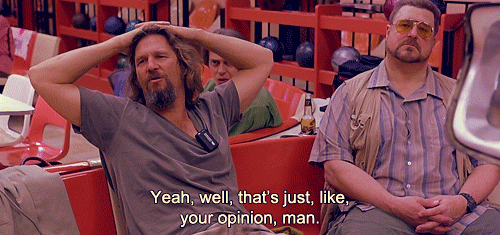 |
| We are Nihilists, Lebowski! |
Further Reading/Watching
Feminist Frequency - #2 Women in Refrigerators (Tropes Versus Women) [Video] (This focuses mostly on comic books, but also includes some examples of video games and does a great job of pointing out the trend. In fact, I recommend all the Feminist Frequency videos.)
The TV Tropes entry on Women in Refrigerators - Oh, I'm sorry, were you planning to do something productive after reading here? (Seriously, has some good links and examples. Check out the page for women who die in childbirth too.)
Next time: Sylvanas, Tyrande, and dis-empowerment.
Twitter may have led me to this post several months late, but I just wanted to say this is an awesome summary of the sexism that squeezes through testing into Warcraft.
ReplyDeleteI particularly liked your quick paragraph on what might have been: it seems the overwhelming majority of angry comments on feminist posts are focused on this supposed loss of creativity if the creators make an active effort to cut out sexism, when really every challenge for an author is another chance to increase the depth and originality of a story.